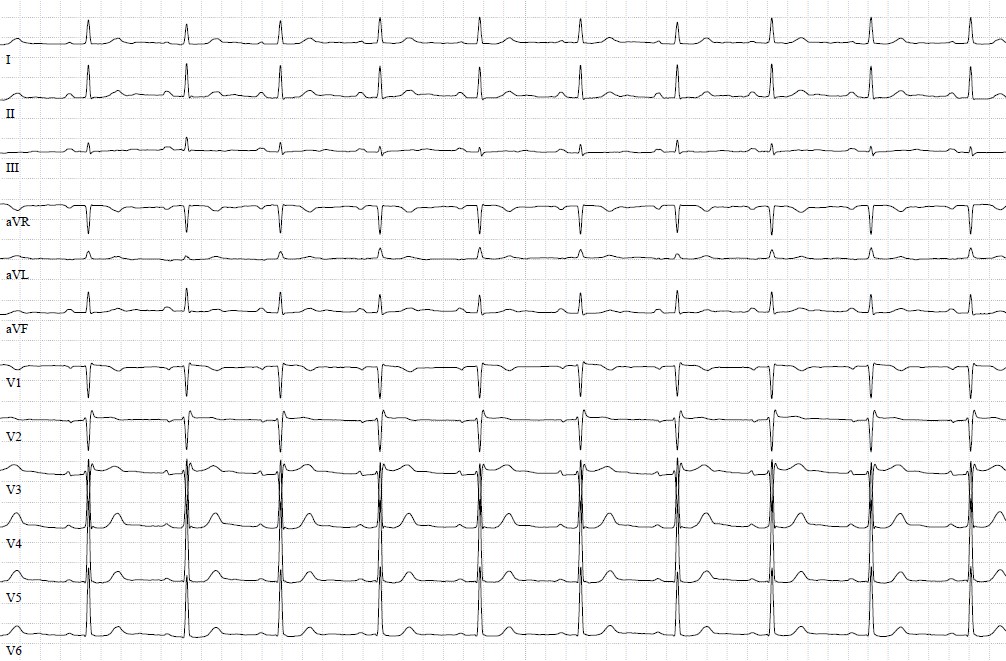An acute coronary syndrome is an emergency: a coronary vessel is occluded or severely narrowed and a life-threatening ischemia of the heart may occur. The patients experience pain, dyspnoea and severe chest tightness. In the emergency department, an electrocardiogram (ECG) will first be recorded. If ST-segment elevation is present, a ST-segment elevation myocardial infarction is evident and a coronary angiography is immediately carried out to identify and reopen the occluded coronary artery.
If ST-segment elevation is not present on the ECG, a non-ST-elevation acute coronary syndrome (NSTE-ACS) is suspected and blood is taken from the patient to determine a cardiac biomarker, i.e. high-sensitive troponin. If this cardiac biomarker is elevated, a non-ST-segment elevation myocardial infarction is diagnosed. Whereas, if the troponin is not elevated, unstable angina pectoris is diagnosed. The guidelines recommend an early invasive catheter intervention within 24 hours after hospitalization for high-risk patients with NSTE-ACS.
The recommendation is based on several studies showing that an early coronary angiography shortens the duration of hospitalization and symptoms of a cardiac ischemia do not recur as often. These studies were, however, too small to draw a definitive conclusion if the timing of coronary angiography also influences the death rate.
High-risk patients profit
Dr. Alexander Jobs, DZHK researcher at the University Medical Center Schleswig-Holstein and at the University of Lübeck, together with colleagues at the Munich partner site, and the Leipzig Heart Center, has now discovered with a comprehensive meta-analysis that an early coronary angiogram may reduce the number of deaths in four high-risk groups of patients with NSTE-ACS. These include patients who are either above the age of 75, have diabetes, have elevated cardiac biomarker values at admission, or have a high point value in a risk score. Whereas, if all 5,324 patients examined with NSTE-ACS are taken into consideration, the early intervention, in comparison to the coronary angiogram at a later point in time, did not reduce the death rate. The data for the analysis come from eight studies. Unlike previous meta-analyses on this topic, Jobs and his colleagues were able to analyse individual patient data of the individual studies within the scope of a scientific cooperation. Furthermore, longer follow-up periods were available. “As a result, our analysis became more statistically powerful and we were able to analyse sub-groups for the first time”, explains the resident physician of the University Heart Center Lübeck. Since the statement regarding the high-risk groups is based on the evaluation of such sub-groups and therefore exploratory in nature, the scientists are currently planning a large randomized study to confirm these explorative results.
For the publication of the meta-analysis in The Lancet, Jobs received the publication prize of the Interventional Cardiology Research Group (AGIK) of the German Cardiac Society (DGK) e. V.
Original study:
Optimal timing of an invasive strategy in patients with non-ST-elevation acute coronary syndrome: a meta-analysis of randomised trials. Jobs A, Mehta SR, Montalescot G, Vicaut E, Van't Hof AWJ, Badings EA, Neumann FJ, Kastrati A, Sciahbasi A, Reuter PG, Lapostolle F, Milosevic A, Stankovic G, Milasinovic D, Vonthein R, Desch S, Thiele H. Lancet. 2017 Aug 19;390(10096):737-746. DOI: http://dx.doi.org/10.1016/S0140-6736(17)31490-3
Contact: Christine Vollgraf, Public Relations Officer, German Centre for Cardiovascular Research (DZHK), phone: +49 30 3456 529 02, presse(at)dzhk.de
Dr. Alexander Jobs, II. Department of Medicine, Cardiology, Angiology, Intensive Care Medicine, University Medical Center Schleswig-Holstein, University Heart Center Lübeck, alexander.jobs(at)uksh.de

